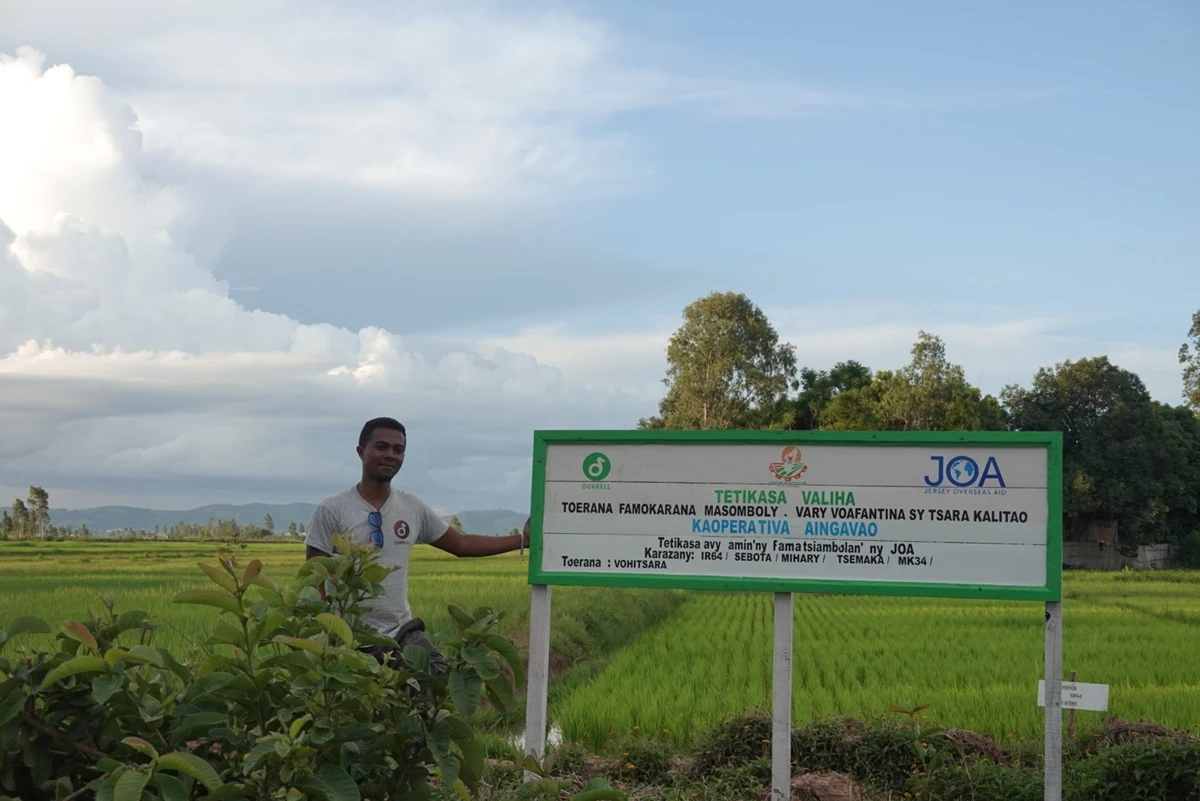Visiting the FFS in Andilana Nord where coffee beans are growing alongside soya beans, using pesticide created from a nearby tree and compost fertiliser produced from the invasive water hyacinth.
Village Savings and Loan Associations (VSLA): Financial Independence
In rural communities, access to banking services is often limited. To bridge this gap, Durrell has supported the creation of VSLA groups – informal community groups that allow members to save, take out loans, and earn interest. In Antamboho, we heard from the members of the VLSA that some people in the community were hesitant initially, but after witnessing the groups’ success, many returned to rejoin, recognising the value of savings during financial hardship.
Fishermen’s Associations in Baly Bay: Financial Independence and Food Security
Baly Bay is famed for its seafood, and during our visit, it was shrimp season – delicious, yet a declining income source for fishermen. Overfishing has drastically reduced catches. One fisherman from Antamboho shared that he used to catch 20kg in two hours; now, after six hours on the water, he often returns empty-handed. This is an additional drive for supporting the uptake of farming within the community, as need to diversify food and income increases.
To address this, Durrell has helped local VOIs to implement fishing closed seasons, and supported patrol groups. Fishermen have also been encouraged to form cooperatives (improving their power to negotiate a better price for catch) and provided pirogue boats to access better-paying external markets like that in the coastal town of Majunga.
Mangrove Restoration: Community-led Restoration
Mangroves are vital for coastal protection – especially against hurricanes and tidal surges. However, unsustainable harvesting has thinned these forests, endangering both biodiversity and community safety. Durrell’s Madagascar team developed an innovative drone-based planting method that increases reforestation efficiency. A community nursery is also being established, enabling year-round planting. Simultaneously, training is provided to local residents on sustainable mangrove use and the ecological benefits of restoration. Talking with the team in person and visiting the site illustrated the patience and determination to overcome real world challenges necessary for project success, as access to the mangrove restoration site is determined by a small tidal window - a particular factor we came to understand!
Family Planning: Community Health
In remote areas, healthcare access is extremely limited. Recognising the role that family planning plays in improving financial stability, Durrell supported the creation of ‘health huts’ - private spaces for consultations during community health visits. These huts replace less-private settings like the Fokontany (mayoral) offices that had previously been used for health and family planning visits.
A routine visit cycle has been established with Durrel partner, Marie Stopes Madagascar (MSM), ensuring communities receive regular access to contraceptives and guidance on family planning, allowing families to make informed decisions based on their circumstances.
The VALIHA project in Madagascar is a powerful example of how community-led action, supported by long-term partnerships, can tackle complex environmental and socio-economic challenges. From restoring marshes and mangroves to supporting farmers, fishers, and weavers, the project weaves conservation into everyday life – helping communities secure their futures while protecting fragile ecosystems. Innovations like drone-assisted planting and grassroots savings groups are making sustainable change possible, even in the face of difficult conditions. What stood out most during the visit was the deep trust between Durrell and the project beneficiaries, and the real progress comes from working in close collaborative partnership. And of course, the journey wouldn’t be complete without a few unforgettable encounters with Madagascar’s extraordinary wildlife.


